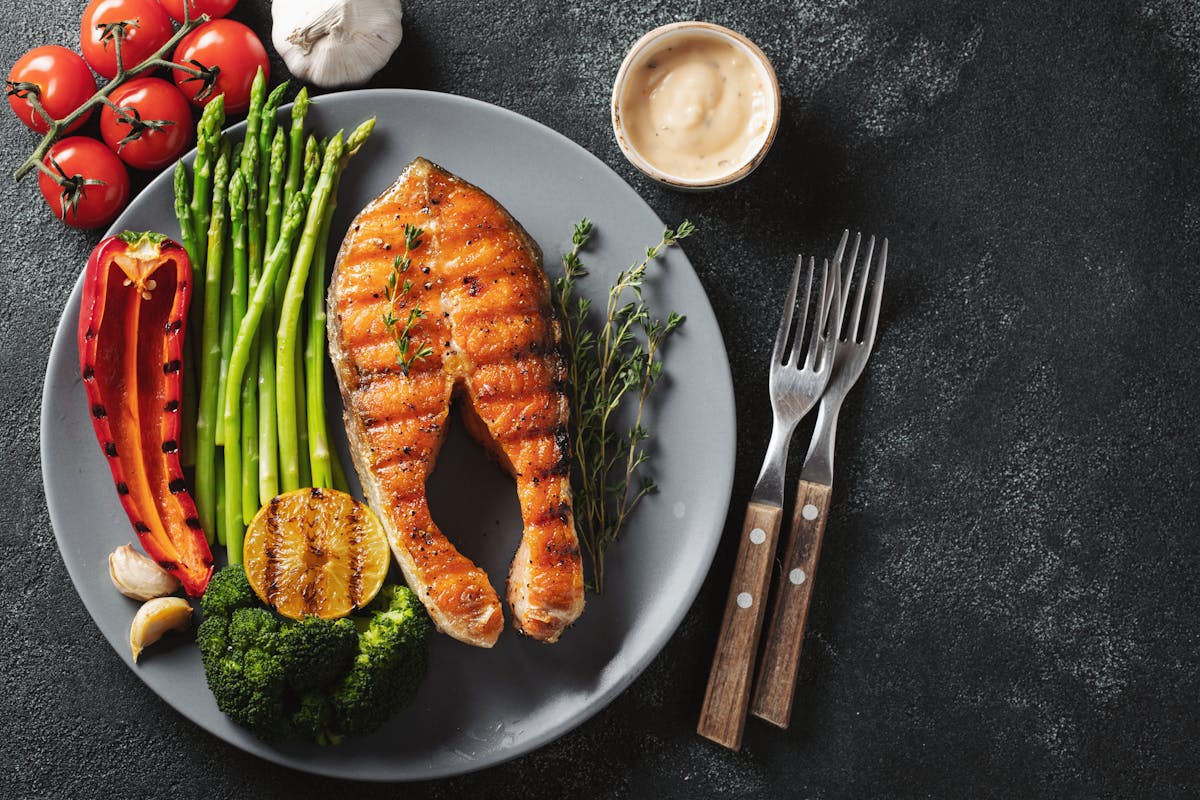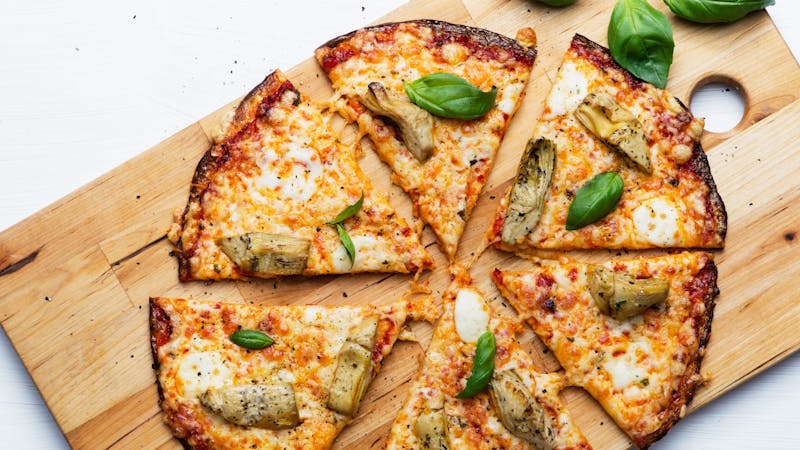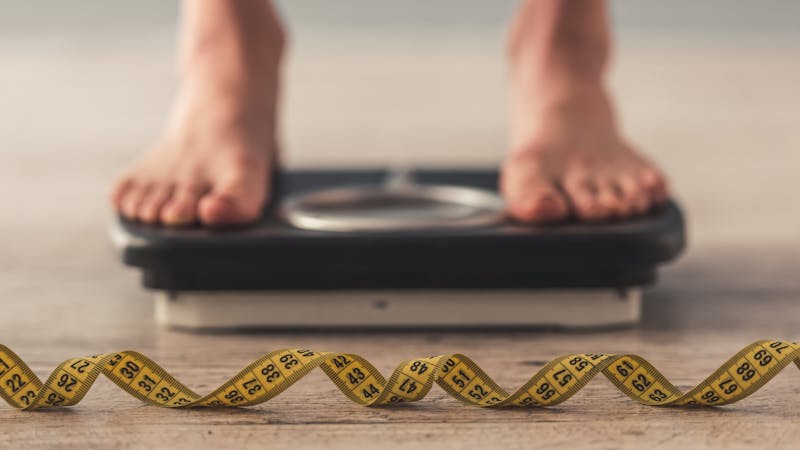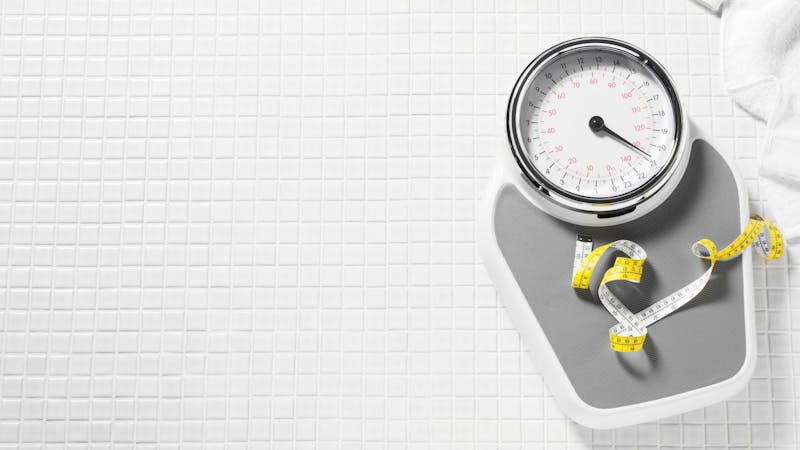How to lose weight with a low-carb diet
Are you ready to lose weight while eating delicious, nourishing food that keeps you satisfied for hours?In a separate guide, we covered all of the research on why low-carb diets can help you lose weight. Here, you’ll learn how to follow a healthy low-carb lifestyle for weight loss.
Keep reading to learn about the best (and worst) foods for promoting healthy weight loss, plus advice on how to more effectively meal plan. In this guide, we’ll also explain why you may not be getting the results you want while on low carb — yet!
1. Getting started on a low-carb weight loss diet
The first step: What should you eat?Foods for weight loss
Many of the best foods for weight loss are very low in carbs, nutritious, and filling, such as:
- Eggs1
- Seafood
- Meat2
- Cheese3
- Non-starchy vegetables
Complete list of low-carb foods
Some – but not all – studies have shown that adhering to low-carb diets based on these foods results in better weight loss than following low-fat diets.4
Foods to avoid for weight loss
You probably already have some idea of the types of foods you should stay away from on a low-carb weight loss diet. Many of them are the same kinds of foods you would limit on any diet, such as:
- Cake, cookies, ice cream, and other desserts
- Pancakes and waffles
- Chips and fries
- Soda and other sweet drinks including fruit juice
- Whole-grain breads and cereals
- Milk
- High sugar fruit (berries are likely the best options)
It’s not that these foods are “evil” or “bad” for you, but they do break down into sugars that can raise your insulin levels and potentially make it harder to lose weight.5
Complete list of foods to avoid
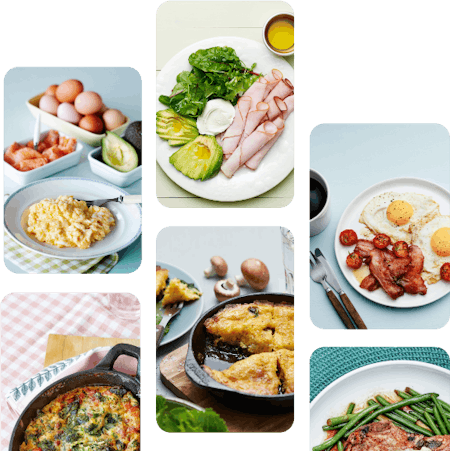
Meal planning tips
Low-carb meal planning is really quite simple:
- Start with a generous serving of protein (meat, fish, eggs, cheese, or tofu). Shoot for at least four ounces (113 grams), a serving about the size of a deck of cards.6
- Add as many non-starchy vegetables as you want.
- Include a tablespoon or more of fat (such as butter or olive oil) for cooking. Fat will make those low-carb veggies taste delicious, so add dressing, drizzle, or dip — enough to feel satisfied.
- Season with salt, herbs, and spices.
- Include a glass of water or another low-carb beverage.
- Use lettuce in place of bread for sandwiches and burgers.
- Shred cauliflower and pan-fry in oil to make cauliflower “rice” for use in a low-carb burrito bowl or as a side dish for meat or fish.
- Cut zucchini into spirals to make noodles, aka “zoodles.” Sauté them in butter and garlic, then top with chicken or your protein of choice.
- Boil cauliflower until tender, then blend together with butter, cream, and salt to make mashed “faux-tatoes” as a side dish — and an excellent gravy transport vehicle — for turkey or other protein.
2. Why you aren’t losing weight with low carb
Despite the best of intentions, both newbies and experienced low carbers sometimes do things that can slow down weight loss. These include eating too many nuts, consuming a lot of dairy, or simply eating too often.7
Here’s a list of common low-carb weight loss mistakes to avoid:
- Fear of fat: Many people find it hard to give themselves permission to eat fat when they begin a low-carb diet. This is perfectly understandable, since we’ve all heard that fat is bad for our health and that eating fat will make us fat.
However, the fat found in natural, unprocessed foods does not appear to be unhealthy.8 Just remember to not overdo it since the calories in fatty foods can add up quickly.
To succeed on a very low-carb diet, you should lose your fear of fat. There’s no need to add heaps of butter or pour oil on your food, but it’s fine to include a tablespoon or more during or after cooking. Here’s our list of the top 10 ways to eat more fat. - Eating too many nuts: Yes, they’re healthy, delicious, and generally low in carbs, but nuts are also one of the easiest foods to over-consume. Your mind wanders for one second and a whole bowl of macadamia nuts disappears! According to a large review of several trials, overweight people seem to take in more calories overall when they eat nuts.9
- Eating too much dairy: Like nuts, dairy products are tasty, nutritious and all too easy to overeat. Avoid milk on a strict low-carb diet because it contains lactose (milk sugar). Yet even full-fat, low-carb dairy like cheese and yogurt may interfere with weight loss in some cases.10
Another option is to change to low-fat, high protein versions of your favorite dairy such as low-fat cottage cheese or Greek yogurt.
Butter usually isn’t an issue on low-carb diets, as long as you don’t overdo it and add just enough for taste and cooking purposes.
- Eating too often or too much: Although low-carb meals generally help people feel full for several hours, many of us have a habit of snacking frequently. But eating mini-meals throughout the day may not be great for losing weight. In fact, eating only two or three times a day may be your best bet.11
Also important: Try eating only when you are hungry and stop as soon as you begin feeling full.
Read more in our guides on intermittent fasting and time restricted eating.
- Indulging in low-carb treats: Sugar-free ice cream, keto candy, and low-carb baked goods can be tempting, but — like their high-carb counterparts — can get in the way of weight loss.12 The worst offenders? Packaged “low-carb” or “keto” bars, which often contain sugar alcohols that may impede your progress.13 Still, even homemade low-carb treats should be minimized because they’re easy to over-consume and may lead to carb cravings.14
- Consuming too many keto-friendly drinks: Although plain water is the only beverage your body needs, coffee, tea, and certain alcoholic beverages can also be enjoyed on a low-carb diet. But keep in mind that drinking too much alcohol or butter coffee can slow down weight loss.15 To get the best results, limit yourself to just one glass or cup per day.
3. Frequently asked questions
Is low carb safe?
Yes, low carb is generally a safe and healthy way of eating. We’ve written an article that addresses the most common concerns people have about low-carb diets: Top 17 low-carb and keto controversies
How fast will I lose weight on a low-carb diet?
Unfortunately, there’s no way to know how quickly you’ll lose weight on low carb, because it varies so much from person to person. Some people lose 10 pounds or more the first month, while others — who may be trying just as hard — lose about half that much within the same period of time.16
Generally speaking, the more extra weight you are carrying, the more you’ll lose at the beginning.17 However, weight loss tends to slow down for everyone after the first few weeks, because part of the initial weight loss is water rather than fat. That’s OK, because it’s no fun to carry around several extra pounds of water weight, either!
Also, research has shown that weight loss tends to slow down when carb intake is gradually increased during a study, even if people are technically still eating low carb (around 100 grams per day).18
What is the “keto flu,” and how can I prevent it?
The keto flu or low-carb flu occurs when transitioning from a higher carb diet to a very low-carb diet. Symptoms typically include: headache, fatigue, and difficulty concentrating.19 You can prevent or greatly reduce symptoms of the keto flu by following the simple advice in our guide, The keto flu, other keto side effects, and how to cure them.
Will I be able to eat more carbs after I lose weight?
Perhaps, although you’ll probably need to keep your carb intake well below where it was before you started low carb.20
Many people find that they get the best weight loss results eating about 20 grams of net carbs per day and can maintain their new weight eating twice that much or more. Still, some prefer to remain close to 20 grams or so most of the time.21 This is something you can experiment with once you’re in maintenance.You can learn more in the section on testing your carb tolerance in our carb cycling guide.
4. The bottom line
The science is clear and so is the way forward: low carb can be a safe and effective way to lose weight. And here, at Diet Doctor, you’ll have plenty of company along the way.
Although not everyone experiences major or rapid weight loss on low carb, this way of eating will allow you to lose weight at your own pace, while enjoying delicious food without going hungry.
We want to support your weight loss journey in any way we can. In doing so, we created hundreds of low-carb recipes, meal plans, guides, and other helpful tools that are available whenever you need them.
We also have content on how to eat a higher-satiety diet that may help you fine-tune your low carb eating for even more success with healthy weight loss.
Here’s to losing weight on low carb in a healthy, sustainable way!

How to lose weight with a low-carb diet - the evidence
This guide is written by Franziska Spritzler, RD and was last updated on August 12, 2022. It was medically reviewed by Dr. Michael Tamber, MD on June 2, 2021 and Dr. Bret Scher, MD on May 26, 2022.
The guide contains scientific references. You can find these in the notes throughout the text, and click the links to read the peer-reviewed scientific papers. When appropriate we include a grading of the strength of the evidence, with a link to our policy on this. Our evidence-based guides are updated at least once per year to reflect and reference the latest science on the topic.
All our evidence-based health guides are written or reviewed by medical doctors who are experts on the topic. To stay unbiased we show no ads, sell no physical products, and take no money from the industry. We're fully funded by the people, via an optional membership. Most information at Diet Doctor is free forever.
Read more about our policies and work with evidence-based guides, nutritional controversies, our editorial team, and our medical review board.
Should you find any inaccuracy in this guide, please email andreas@dietdoctor.com.
Eggs are highly nutritious with protein and vitamins. Although they’re high in cholesterol, eating them doesn’t seem to raise cholesterol levels much in most people, and doesn’t raise the risk of cardiovascular disease.
In fact, eating eggs may reduce cardiovascular risk by improving the ratio of HDL to LDL cholesterol:
Current Opinion in Clinical Nutrition and Metabolic Care 2006: Dietary cholesterol provided by eggs and plasma lipoproteins in healthy populations [overview article; ungraded]
Though we at Diet Doctor believe that eggs are healthy, conflicting research based on weak observational data that suffer from numerous confounders continues to be published, making it difficult to draw definitive conclusions.
For example, this recent meta-analysis of observational studies found no effect of eating more than 1 egg/day on the risk of overall cardiovascular disease, while also finding a decreased risk of coronary artery disease with eating more than 1 egg/day:
American Journal of Medicine 2021: Association Between Egg Consumption and Risk of Cardiovascular Outcomes: A Systematic Review and Meta-Analysis [meta-analysis of nutritional epidemiology studies with HR below 2, very weak evidence]
While this recent observational study found that higher intakes of eggs and cholesterol were associated with higher all-cause, cardiovascular, and cancer mortality:
PLoS Medicine 2021: Egg and cholesterol consumption and mortality from cardiovascular and different causes in the United States: A population-based cohort study [nutritional epidemiology study with HR below 2, very weak evidence]
Interested in learning more? Check out our detailed guide on eggs.
↩Meat is a high-quality source of protein and other nutrients that has been unfairly demonized for directly increasing the risk of heart disease, cancer, and other diseases. However, this is based on considerably weak scientific evidence that cannot adequately support the claims: Guide to red meat: is it healthy? ↩
Cheese, butter, cream, and other foods high in saturated fat can be enjoyed on a low-carb diet. Although there’s still disagreement among many experts, several large systematic reviews of clinical trials have found no evidence that saturated fat increases risk of heart disease, early death, or other health issues:
Nutrition Journal 2017: The effect of replacing saturated fat with mostly n-6 polyunsaturated fat on coronary heart disease; a meta-analysis of randomized controlled trials [strong evidence]
Read more in our guide on saturated fat.
↩PLoS One 2016: Dietary intervention for overweight and obese adults: comparison of low-carbohydrate and low-fat diets. A meta-analysis [strong evidence]
Obesity Reviews 2016: Impact of low-carbohydrate diet on body composition: meta-analysis of randomized controlled studies [strong evidence]
↩Diabetes Care 2004: Dietary carbohydrate (amount and type) in the prevention and management of diabetes [overview article; ungraded] ↩
Protein can help you feel full and satisfied:
Physiology & Behavior 2008: Protein-induced satiety: effects and mechanisms of different proteins [overview article; ungraded]
See our handout to learn how to determine a daily protein goal based on reference body weight
↩This is based on clinical experience of low-carb practitioners and was unanimously agreed upon by our low-carb expert panel. You can learn more about our panel here [weak evidence]. ↩
Although the issue remains somewhat controversial, several recent systematic reviews of randomized controlled trials and large observational studies have failed to show a connection between eating saturated fat and increased heart disease risk:
Open Heart 2016: Evidence from randomised controlled trials does not support current dietary fat guidelines: a systematic review and meta-analysis [strong evidence]
Nutrition Journal 2017: The effect of replacing saturated fat with mostly n-6 polyunsaturated fat on coronary heart disease: a meta-analyses of randomised controlled trials [strong evidence]
Learn more:
A user guide to saturated fat ↩Critical Reviews in Food Science and Nutrition 2018: Effect of nuts on energy intake, hunger, and fullness; a systematic review and meta-analysis of randomized clinical trials [strong evidence] ↩
This is mainly based on clinical experience [weak evidence] ↩
Eating less often may be more beneficial when it comes to weight loss and metabolic health:
Diabetalogia 2014: Eating two larger meals a day (breakfast and lunch) is more effective than six smaller meals in a reduced-energy regimen for patients with type 2 diabetes: a randomised crossover study [moderate evidence]
PloS One 2012: Effects of meal frequency on metabolic profiles and substrate partitioning in lean healthy males [randomized trial; moderate evidence] ↩
This is based on clinical experience of low-carb practitioners and was unanimously agreed upon by our low-carb expert panel. You can learn more about our panel here [weak evidence]. ↩
Maltitol, one of the most common sugar alcohols in low-carb chocolate and bars, is partially absorbed by your body and can raise your blood sugar and insulin levels:
Nutrition Research Reviews 2003: Health potential of polyols as sugar replacers, with emphasis on low glycaemic properties [overview article; ungraded] ↩
This is mainly based on clinical experience [weak evidence] ↩
This is mainly based on clinical experience [weak evidence] ↩
As an example of the large individual variation, here are self-reported results from our two-week keto challenge:
This is mainly based on clinical experience. [weak evidence] ↩
Journal of the American Medical Association 2007: Comparison of the Atkins, Zone, Ornish and LEARN diets for change in weight and related risk factors among overweight premenopausal women. The A to Z weight loss study: a randomized trial[moderate evidence]
New England Journal of Medicine 2008: Weight loss with a low-carbohydrate, Mediterranean, or low-fat diet [randomized trial; moderate evidence] ↩
Nutrition X 2019: Effects of differing levels of carbohydrate restriction on mood achievement of nutritional ketosis, and symptoms of carbohydrate withdrawal in healthy adults: A randomized clinical trial [randomized trial; moderate evidence] ↩
Based on clinical experience, people tend to regain weight when they go back to eating high carb [weak evidence] ↩
This is mainly based on clinical experience. [weak evidence] ↩
